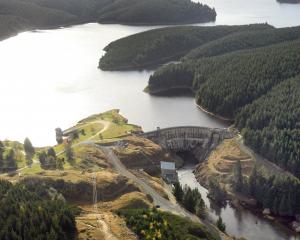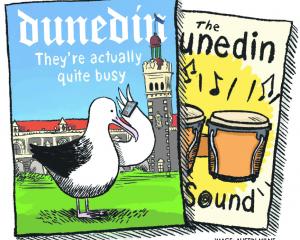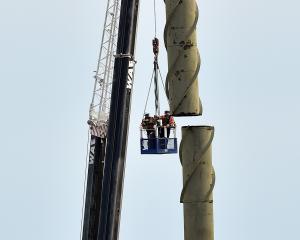It is the success stories that get Amanda Ellis out of bed each day.
Bit by bit the lead specialist with the World Bank's Gender Action Plan, based in Washington DC, sees she is making a difference to women in developing countries, both economically and socially.
Her work is about more than just gender equality. It is about economic and social common-sense.
The former Columba College and Bayfield High School pupil and University of Otago graduate said studies showed giving women in developing countries disposable income meant it was more likely to be spent benefiting their family's nutrition and educating their children.
She also quotes studies which show that increasing the global economic participation of women in the past decade exceeded China's economic growth over the same period.
Ms Ellis's career has been a mix of public- and private-sector jobs here and in Australia, before love stimulated her to move to Washington, following her United States-born husband, and there she landed an unexpected job at the World Bank.
She has mixed altruism and capitalism in her short but relatively successful career, choosing jobs which blend experience and an ethic of improving people's lives.
"I want to feel I am able to make a difference, not just make money."
Ms Ellis recalls being drawn to a career with the Department of Foreign Affairs after reading an article when she was aged 13 about an official's experience while working for New Zealand in Singapore. She relished the opportunity of promoting New Zealand and interacting with other cultures.
After leaving university and a period of travelling overseas, she did her Masters degree at the Hawaii-based East West Centre, where she met her future husband.
She returned home and followed her dream, joining the Department of Foreign Affairs for which one of her first postings was to the OECD in Paris.
"For a French-speaking economist it was nerd heaven."
Later, she served as New Zealand Counsel for French Territories based in New Caledonia and in 1995 found herself at the heart of the diplomatic crisis with France over nuclear testing at Mururoa Atoll.
One of her roles was checking the wellbeing of New Zealand protesters in Tahiti or at sea in boats.
Later, she was involved in overseeing part of New Zealand's foreign aid programme in parts of Asia, and it was here that she could see how aid money could effectively be used to raise women out of poverty.
Ms Ellis recalled visiting a village where aid money had been used to establish a silk fabric industry where previously the residents had nothing.
"That was where my intense interest in women's entrepreneurship and development really began."
In 1998, she moved to Westpac Bank, initially as head of communications but then to create a Women in Business unit.
Surveys showed that banks were not connecting with women but were demeaning them, and Ms Ellis said this meant there was a huge business opportunity.
Her unit set about training staff and telling women the bank wanted their business, and within three years was credited with generating $504 million in new business.
Two books on women in business followed, but love drew her to the United States with her fiance.
She had no job, but ended up at the World Bank.
She started the Gender Entrepreneurship Markets (Gem) initiative at the International Finance Corp, the private-sector arm of the World Bank, which helped channel private and public money to developing countries to assist women to start their own businesses, and provided law and policy advice.
A recently widowed Tanzanian woman was helped to set up a micro-leasing business which equipped widowed and impoverished women in her village, allowing them to start earning income.
Her business has grown and now turns over $US6 million and she employs 60 people leasing equipment and training people to use it.
So far, $US41 million in credit lines has been provided for women in Africa alone, but it was not all plain sailing and there had been conflicts with cultures and traditions - Ms Ellis easily lists some of the traditions and obstacles faced by women and by her group.
In the Democratic Republic of Congo a woman wishing to start a business has to take her husband to a business registry to give permission. If she is single, a court judge has to consider her request; in Swaziland a husband has to approve his wife opening a bank account; in Cameroon a husband can put his wife's name on a list preventing her from working or opening a business.
In Kenya, husbands receive all the proceeds from a cash crop and just 1% of land titlesare held by women.
This was despite proof that economically independent women benefited countries.
However, it was not a case of imposing Western solutions.
She said Gem had to be careful and sensitive to those traditions, but often her organisation was invited by a government to give advice.
"If we want to make a positive programme, we have to engage on multiple levels with multiple players."
It worked with women lawyers' and women's business groups to identify obstacles to women starting businesses, and found gender inequality had cost Uganda 2% of its GDP.
They were able to tap into that potential by redrafting the Companies Act, introducing new chattels transfer legislation and laws regarding leasing.
"Small changes can provide a better business framework but can be disproportionately beneficial to women."
By improving the lives of a few her group was helping reduce poverty, Ms Ellis said.
She has matched her actions on gender inequality with cash, establishing the Amanda and Natalie Ellis Women Leaders Scholarship Award so University of Otago graduates from New Zealand and Australia can attend the East West Centre Asia Pacific Leadership Programme.
The scholarship fund is being launched this year in honour of her mother, Natalie, a speech and drama teacher at Columba College for 40 years.
While in Dunedin, Amanda Ellis gave a lecture to the University of Otago School of Business and on Monday will attend Columba College's annual Business Hall of Fame for new inductees, having last year been one of three inaugural past pupils to be inducted.
So what of the future?
Like many Kiwis, Ms Ellis' heart still pulls her home and she would like to raise her son in New Zealand.
In the meantime, her jet-setting career will take her from New Zealand to the South Pacific before returning to the United States.
Personal History
Amanda Ellis (46).
• Married to: Keric, one son Mitchell (5).
• Lives: Washington DC.
• Schooling: Columba College and Bayfield High School.
• 1981-84: University of Otago, graduated with honours in Economics and French.
• 1987: Masters degree East West Centre, Hawaii.
• 1988-98: Ministry of Foreign Affairs.
• 1998- 03: Westpac Bank in Australia.
• 2003-today: World Bank based in Washington DC.













